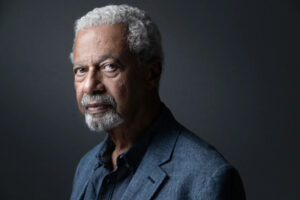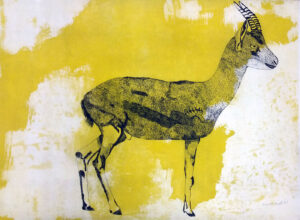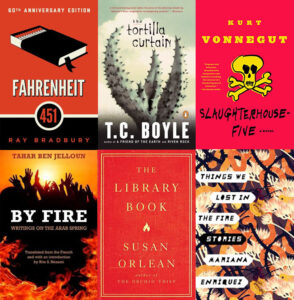Select Other Languages French.
Two children trapped in the Gaza war zone flee from dragons and sorcerers. The magical realism short story explores the horrific day-to-day experiences of the Palestinian people and the radicalizing influence of violence.
Sami covered his ears against the howls of the dragons. Their fiery tails glowed like small suns in the night sky, their eyes flashing red and green. Their screeches left his ears ringing, his body trembling. The fireballs would follow soon, whistling like fireworks until they landed and shook the ground, their flames incinerating life, memories, any sign that they had existed. It was how his parents had died; his sister and grandparents too. It was how most people died here, annihilated by the dragons that swept past each day and night. Few places were safe. That was why they had to escape, and Ismail had, at last, found a way.
Ismail carried what little food and drink they’d scrounged — a few millimetres of cola in a dirty plastic bottle. Sami’s cracked lips pleaded for water, his mouth and tongue covered in the dust of fallen buildings. It was another reason Ismail said they had to try and escape. Nowhere left to hide. Nothing left to eat or drink.
“Sami,” Ismail called. His brother had moved ahead, hiding behind a mound of stone and mortar that was once the outside wall of a shop. Sami caught up.
“Stay close. We haven’t got far to go. Keep listening for the seekers.”
Sami nodded and kept a step behind Ismail. He didn’t know what he’d do without his brother. Sometimes when they found a place to rest, they spoke about Mamma, Baba, and Fatima. Sami wondered whether God had shown them mercy in taking their lives. That perhaps he and Ismail had wronged Him and were paying the price, forced to endure life in this hell. Sometimes they spoke about Sami’s nightmares. It was always the same dream — finding his family’s bodies still and lifeless, covered in blood, mangled by the rubble. He shouted their names, shook them, and then the dragons came again…
Ismail was always there when he woke. His brother never seemed to sleep, not since they had to leave home. Ismail forever watched the skies for the dragons and listened to how close their fireballs dropped. When they fell too near, they moved.
The sorcerers with their magical weapons closed in each day too. Right now, in the distance, Sami could hear the deep, fast thuds of their magic. Worst of all, though, were the seekers. Some people called them zenana. They forever buzzed overhead as they scoured the streets, looking for targets. When their buzzing stopped, Sami’s heart stopped too, for it meant one thing — they’d found a target for the dragons and sorcerers.
Sami jumped as the dragons flew by again, their whooshes echoing long after they disappeared from view. Sirens rang out in the distance. Families called out the names of those who were missing. His heart lurched when he heard their sorrowful calls. He hoped they found who they were looking for. Starving dogs barked, and he felt bad that he didn’t have any food to give them.
They moved from ruined husk to ruined husk, listening for the seekers. Doors were long gone; windows too, the ground littered with their glass shards. Shadowy holes gaped before them, portals to lost lives and memories. Here and there, Sami saw fragments of what had existed before — torn photographs, clothes stained with blood, beds they slept in, pictures that hung upon their walls, wooden clocks that no longer ticked. Craters deep as ponds occupied spaces where homes and shops had stood, pits filled with dust, bricks, and metal, with only scraps of clothing and the odd mattress suggesting people once lived here. In other parts, the remains of collapsed buildings piled high. Tombs for those crushed within.
When the dragons first came, people said they would leave them all alone soon enough and then they could rebuild, like they had before. But they came back day after day, their relentless fireballs pounding and scorching the earth and reducing everything to dust. Sami could see no way to rebuild any of it. Like the cracked shards of the mirror on the ground before him, it could be reassembled but it would never look the same. As he walked past the mirror, he caught the reflection of his thin, dirty, and disheveled frame and got a fright. He reached out for Ismail and grabbed a handful of his football jersey.
They moved through the shadows, out of the gaze of the seekers. Sami heard voices. Looking around, he found a group of people huddled within an old shop, its windows broken, the doorframe twisted and bent. Their lips moved fast in prayer, all of them holding hands. Sami wished he still had his mother and father to pray with.
They stopped where the shadows ended. Ismail pointed to his ears. Sami could hear it too — the whirring of a seeker. Sami’s heart pounded as if fireballs were exploding in his chest. Holding Ismail’s hand gave him comfort. The buzz grew louder. He couldn’t see it, but he knew where it was judging by the dust and paper shuffling on the ground from the wind of its blades. Sami buried his head into Ismail as the buzzing filled his ears. Visions of his dead family flooded his mind, and with it, fear that the same thing was about to happen to him.
The seeker moved past them slowly, searching.
“It’s gone,” Ismail said after the longest minute of Sami’s life. His grip on Ismail relented. They wasted no time, Ismail leading them out of the shadows, across the open road, and down an alleyway. It was so dark Sami kept tripping over rocks and who knew what else. Ismail steadied him. A little further on, Sami heard a growl. Then another.
“Istena, Sam,” Ismail said, putting his arm out in front of him. In the gloom, Sami could just make out the whites of eyes and bared teeth. Dogs, half-starved, half-deranged. They stood over a human-shaped lump.
Ismail picked up a metal pole and held it out in front of him as if it were a sword. “We need to get past them. Stay behind me, okay?”
Sami didn’t argue. He grabbed Ismail’s outstretched hand, and they began to shuffle forward, hugging the wall opposite the dogs. One barked, snapped and lunged. Ismail swung. The dog flinched and retreated, teeth bared. They seized their chance to run. Sami looked back to see the dogs tearing into a leg.
They reached a square where the buildings had slumped forward to fill the open space with rubble. A couple of days before, they had passed through here and everything had stood upright. A digger machine lay on its side at the top of the mound, its great metal arm reaching toward the sky like a dying soldier. Its caterpillar tracks were broken and scorched by fire. Those trapped below would remain so, if anybody was still alive. Ismail moved around the great yellow arm, hurrying down a road just beyond it. Sami followed close behind.
“Can you smell the salt, Sami?” A weak grin formed on Ismail’s soot-stained face as he pushed his long, wavy hair out of his eyes and behind his ears. Before the dragons came, Ismail had obsessed about looking like Mo Salah, but now his locks were full of grease and dust.
Sami couldn’t smell any salt, but the breeze upon his cheeks was fresh, untainted by charred wood and flesh, of rot and blood and death. It smelled like freedom. Sami’s lips curled into a smile. Only for it to disappear like so many people had in this place.
The roars of the dragons filled the night. They unleashed their fireballs, whistling through the air. The deep rumbles, bangs, and clatter of brick and mortar confirmed they’d struck. The ground shifted, threatening Sami’s balance, and the dark sky lit up with the red and orange glow of fire.
Screams and shouts echoed through the streets. They were soon snuffed out by more dragons that flew by overhead. More fireballs dropped from the sky. Ismail grabbed Sami’s hand, pulled him forward. There was no point in shouting. All Sami could hear were the dragons whooshing by, their fireballs exploding, and the city shaking and crumbling. But on the brothers moved. Tears rushed down Sami’s cheeks. Fear gripped his heart, tried to freeze his legs. But Ismail kept pulling him along, his grip on his hand strong and firm, just like their father’s had been.
Another group of dragons roared past. Before they could think to take cover, Sami found himself on the ground, his ears ringing. More dust clogged an already dry mouth. He rubbed grit from his eyes. Plumes of smoke surrounded him.
“Sami,” Ismail shouted.
“Here,” he managed to say. His brother appeared through the smoke like an action hero.
“Are you okay?”
“I think so.”
“Bastards won’t stop dropping bombs. Can you keep moving or do you want me to carry you?”
“I can move.”
He’d grazed his knees and elbows, but he wasn’t hurt. He couldn’t say the same for anybody who’d been in the building the fireball had struck. With the dust dispersing, Sami saw fires raging in the top half of a building no more than 20 meters away. On the street before it, the bricks and mortar from one side had fallen into a great mound that blocked their path.
“We can go this way,” Ismail said, pointing to the right and leading on again. Sami knew Ismail was determined to see them leave this place, to find somewhere safe. They spoke about it each night as they tried to distract themselves from the cold and hunger. West was the direction Ismail said they needed to go, a place where there were no dragons and no sorcerers with their loud weapons. There, people lived in peace. They went to school and work, could laugh and play with their friends and families in parks and on beaches. Sami trusted Ismail and didn’t doubt he was telling the truth — and that brought hope and excitement that they could live a different, peaceful life. But getting there was the biggest problem.
A pile of broken concrete, plaster, and twisted iron bars lay slumped across the narrow road and barred their path. Not long ago, an obstacle like this would have been fun to climb over with Ismail and their friends, seeing how high they could get. Not now. Now, their dirt-encrusted hands were scratched and cut. And in the darkness, it was hard to see the sharp objects hidden among it. Ismail went first, picking a safe route up and across, lending Sami a hand when he needed it.
“Once we get over this, the sea is just ahead,” Ismail said, always upbeat. Sami loved that about him. Ismail, his grip strong, lifted him up another big chunk of rock. They clambered up some other chunks of concrete, using an iron pole for support, and made it to the top. Between two scorched and roofless buildings, they saw pale sand and the waves of the sea, shimmering orange with the reflection of fire.
“We’re nearly there,” Sami said, a smile upon his cracked lips.
Above their heads, a seeker buzzed, and Sami’s smile died. He looked up into its flashing eyes and whirring blades that threatened to kill him at any moment. It shot upwards, out of sight, and the buzzing ceased. Silence was what they all feared — it meant the seekers had found their target for the dragons and sorcerers.
“Run!” Ismail shouted.
Together, they scrambled down the rocks and rubble, the dragons roaring by above, fireballs exploding and rocking the world around them. But Sami focused on his footing, made sure he didn’t trip or slip. When they reached the bottom, Ismail grabbed his hand, and they ran for the beach. As the last buildings fell from view, Sami saw a wooden boat bobbing on the water, so packed with people that waves licked the tops of its sides. Women held children in their arms; men had kids on their shoulders or backs.
The dragons swooped.
“Hurry, Sami!” Ismail said, letting go of his hand. He sprinted through the sand, leaving Sami behind. Fighting tears, Sami moved as fast as he could, pushed on by the mix of panic and hope gripping his heart. A man in the water waved at them to hurry up. Sami couldn’t hold his cries in anymore.
But no one heard them.
The dragons roared and darted through the air. Fireballs whistled as they fell. Flames consumed everything before him. All those faces, all those eyes looking at him, filled with hope of escape and safety, now a vision of hell. Sand shotblasted Sami’s face. Heat washed over him. He lost sight of Ismail, and then he felt himself flying backwards, the breath punched from his lungs as he hit the sandy ground.
Sami heard crying. A baby. But he recognized that cry. It was his cousin, Amal. She’d been born in the summer, before the dragons came, his first baby cousin. He’d never seen a person so small. She wasn’t crying in pain, nor was she scared. Her cries turned to laughter, which made him smile. But that laughter faded, replaced by a monotone ringing that bore into his head. He felt hands on his face, tapping and prodding him. He opened his eyes and saw half a dozen strange men looking down at him, their faces mostly covered.
“He’s alive,” one said.
“Ish,” Sami managed to say. “Amal.”
They ignored him. “Hurry, take him to the tunnels before they come back.”
“Ish,” Sami muttered over and over.
The men grabbed his arms and legs and lifted. Pain erupted in his body. He cried out.
“He’s got shrapnel in him,” a man said. Sami hadn’t heard that word before, but it scared him. His cries intensified, and he yelled out for Ismail at the top of his lungs.
“Sami!” Ismail’s voice cut through everything. Trying to blink away the sand clogging his eyes, Sami looked for his brother, sought out his football jersey. There he was. His face was covered in blood and black soot.
“Sami! Is he okay?” Ismail asked one of the men carrying him. He grabbed onto Sami’s hand.
“He should be if we can get him out of here. Help us, kid.”
The dragons howled through the air again. Those carrying Sami started to run, heading for the cover of a building. Fireballs exploded in the distance, the sound dimming as they moved inside and down some stairs to a basement.
“Will we get far away from the dragons soon, Ismail?” Sami found the strength to ask.
“Yes, Sami.”
It was said the dragons lived in pits where no light or love touched them. Venturing into the gloom now didn’t scare Sami like it once would have. Maybe he’d learn more about them, how to feel nothing like they did, learn how to inflict pain like they had done to him and his family.
Then one day, when he was big enough, he could fight back.













































































































































